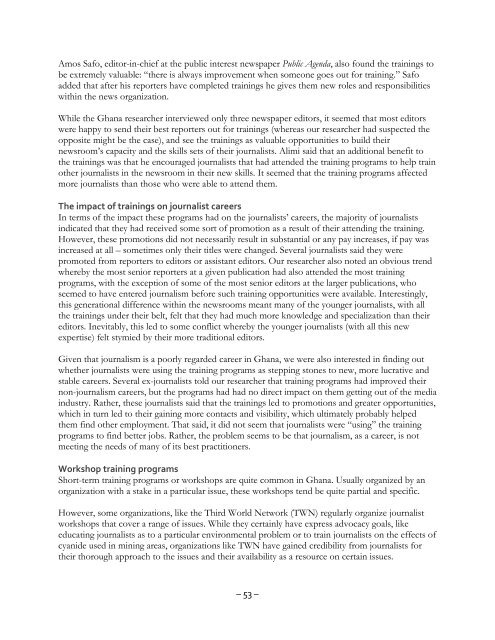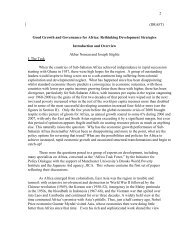on that they then were able to cover with much more confidence and expertise. The topics mostfrequently mentioned as having been helpful to their work were budget monitoring and reporting,the insurance industry, banking, the stock exchange and international financial institutions (IFIs) likethe World Bank and the IMF. Interestingly, the topic that journalists identified as most lacking fromthe various training programs was the extractive industries; the three-month IIJ program includes ashort segment on the extractives, which journalists said was useful but not sufficient to meet theirneeds. 135In addition to being able to cover new topics, many journalists enthusiastically described the impactthat the trainings had on their ability to interpret and use figures and in<strong>for</strong>mation. One journalisttold me that she had been on the World Bank’s media list, but had mostly ignored it be<strong>for</strong>e shecompleted the IIJ training, whereas after her crash course in the IFIs she now takes the “time toread through it and see what I can include in my column on social business stories.”Another journalist, Marian Adjei, of the Concorde newspaper, said that the trainings taught her how towrite business and economic stories that would appeal to her readers, and make abstract issuespertinent and interesting to the man or woman on the street. After the IIJ training, Adjei said shewas “able to analyze [world trade issues], understand them, and write a gripping story about themthat someone could pick up that wasn’t just another minister-said-this-story.”Some reporters noted some unexpected downsides to the training. Ama Achia, a reporter withPublic Agenda, explained a common downside: “When you come back from the training program,you yearn to do more, but you don’t get the opportunity to really focus on one area.” While Achiawas given new topics upon her return to the paper after the three-month IIJ program, she also hadto go back to covering her old beats, which limited her capacity to try out her new skills. SamuelAblordeppey, a journalist with the Daily Guide, also said he couldn’t pursue stories he wanted towrite after the training because they were too technical and apparently not suitable <strong>for</strong> the paper.Edmund Mingle, of the Ghanaian Times, told our researcher that the IIJ training significantlydeveloped his features writing skills, but that he hadn’t been able to use them since returning to thejob, as features aren’t very common in Ghanaian newspapers. Many journalists complained that theyweren’t able to fully incorporate their training into their work.Criticisms of the training programs themselves were minimal and were generally about the relevanceof particular topics (several journalists complained that the IIJ’s component on corruption usedGerman case models that had little relevance to Ghana) or the poor per<strong>for</strong>mance of a particulartrainer.Newspaper editors on the impact of the training programsFortune Alimi, editor-in-chief at the Daily Guide, one of the largest private dailies in Ghana, said thatthe IIJ trainings in particular “diversified [the journalists’] work, with more background, and moresubstantial content.” Alimi said that because of journalists’ training on how to conduct onlineresearch, his journalists’ “reports are now much richer.” Alimi noted with pride that six of hisreporters are pursuing university degrees while on the job, and said he noticed a trend across theindustry where more journalists are getting advanced degrees than in the past.135 Please note that all subjects covered in the trainings are included in the survey data section of this report.– 52 –
Amos Safo, editor-in-chief at the public interest newspaper Public Agenda, also found the trainings tobe extremely valuable: “there is always improvement when someone goes out <strong>for</strong> training.” Safoadded that after his reporters have completed trainings he gives them new roles and responsibilitieswithin the news organization.While the Ghana researcher interviewed only three newspaper editors, it seemed that most editorswere happy to send their best reporters out <strong>for</strong> trainings (whereas our researcher had suspected theopposite might be the case), and see the trainings as valuable opportunities to build theirnewsroom’s capacity and the skills sets of their journalists. Alimi said that an additional benefit tothe trainings was that he encouraged journalists that had attended the training programs to help trainother journalists in the newsroom in their new skills. It seemed that the training programs affectedmore journalists than those who were able to attend them.The impact of trainings on journalist careersIn terms of the impact these programs had on the journalists’ careers, the majority of journalistsindicated that they had received some sort of promotion as a result of their attending the training.However, these promotions did not necessarily result in substantial or any pay increases, if pay wasincreased at all – sometimes only their titles were changed. Several journalists said they werepromoted from reporters to editors or assistant editors. Our researcher also noted an obvious trendwhereby the most senior reporters at a given publication had also attended the most trainingprograms, with the exception of some of the most senior editors at the larger publications, whoseemed to have entered journalism be<strong>for</strong>e such training opportunities were available. Interestingly,this generational difference within the newsrooms meant many of the younger journalists, with allthe trainings under their belt, felt that they had much more knowledge and specialization than theireditors. Inevitably, this led to some conflict whereby the younger journalists (with all this newexpertise) felt stymied by their more traditional editors.Given that journalism is a poorly regarded career in Ghana, we were also interested in finding outwhether journalists were using the training programs as stepping stones to new, more lucrative andstable careers. Several ex-journalists told our researcher that training programs had improved theirnon-journalism careers, but the programs had had no direct impact on them getting out of the mediaindustry. Rather, these journalists said that the trainings led to promotions and greater opportunities,which in turn led to their gaining more contacts and visibility, which ultimately probably helpedthem find other employment. That said, it did not seem that journalists were “using” the trainingprograms to find better jobs. Rather, the problem seems to be that journalism, as a career, is notmeeting the needs of many of its best practitioners.Workshop training programsShort-term training programs or workshops are quite common in Ghana. Usually organized by anorganization with a stake in a particular issue, these workshops tend be quite partial and specific.However, some organizations, like the Third World Network (TWN) regularly organize journalistworkshops that cover a range of issues. While they certainly have express advocacy goals, likeeducating journalists as to a particular environmental problem or to train journalists on the effects ofcyanide used in mining areas, organizations like TWN have gained credibility from journalists <strong>for</strong>their thorough approach to the issues and their availability as a resource on certain issues.– 53 –
- Page 1 and 2:
THEREWILLBE INKA study of journalis
- Page 3 and 4:
AcknowledgementsThis paper has bene
- Page 7 and 8: Executive SummaryPurpose of the Rep
- Page 9 and 10: journalists in these countries that
- Page 11 and 12: Existing International Training Opp
- Page 13 and 14: • Consumer Affairs and Informatio
- Page 15 and 16: Background 3Of the three countries
- Page 17 and 18: pervasive conflict in the Niger Del
- Page 19 and 20: 3) Crises or disruptions, where som
- Page 21 and 22: Low pay and low regardOne of the mo
- Page 23 and 24: Even in cases where working journal
- Page 25 and 26: But while some reporters think FOIB
- Page 27 and 28: When asked how much the media could
- Page 29 and 30: the effects of these challenges for
- Page 31 and 32: detailed analysis of the opportunit
- Page 33 and 34: journalist said he has, however,
- Page 35 and 36: completely make use of some of the
- Page 37 and 38: money. Their knowledge of what medi
- Page 39 and 40: Notes on conducting research in Nig
- Page 41 and 42: Ghana- 35 -
- Page 43 and 44: evenues each year,” 106 which wou
- Page 45 and 46: entertainment news, scandals, and p
- Page 47 and 48: The rise of business-focused journa
- Page 49 and 50: coverage of the oil industry is als
- Page 51 and 52: needed supplementary income to cash
- Page 53 and 54: as supporting one political party o
- Page 55 and 56: Numerous journalists recounted how
- Page 57: Training programs available to busi
- Page 61 and 62: Notes on conducting research in Gha
- Page 63 and 64: Background 136Literacy and Educatio
- Page 65 and 66: “sufficient information” about
- Page 67 and 68: or criminal charges for content the
- Page 69 and 70: have such difficulty obtaining info
- Page 71 and 72: The majority of those interviewed b
- Page 73 and 74: commitment to their profession and
- Page 75 and 76: Notes on Conducting Research in Uga
- Page 77 and 78: Recommendations for Revenue Watch I
- Page 79 and 80: people who have no journalism backg
- Page 81 and 82: analyzes business,” he said, “e
- Page 83 and 84: A journalist with The Punch said,
- Page 85 and 86: The Media Foundation for West Afric
- Page 87 and 88: Length of TrainingRoughly three-qua
- Page 89 and 90: industries, for instance, ought to
- Page 91 and 92: otherwise being published in the pr
- Page 93 and 94: Non-Training Recommendations for Ug
- Page 95 and 96: Appendix A: NigeriaPotential Partne
- Page 97 and 98: journalists. Biakolo is very profes
- Page 99 and 100: Television Stations• Nigerian Tel
- Page 101 and 102: have two to four month professional
- Page 103 and 104: City: AccraTelephone: +233 (021) 22
- Page 105 and 106: Fax: +256 414 255 495E-mail: umdf@a
- Page 107 and 108: • What do you think are the most
- Page 109 and 110:
Appendix E: Survey Questions1. Name
- Page 111 and 112:
18. How effective were the teaching
- Page 113 and 114:
28. What are the most important cha
- Page 115 and 116:
1. Journalists by Country2. How wou
- Page 117 and 118:
5. How often do you travel out of t
- Page 119 and 120:
9. Which organization(s) sponsored
- Page 121:
12. After completing the training(s














